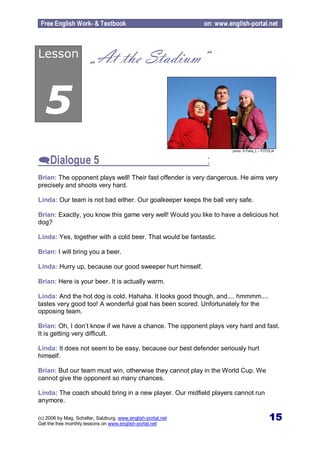Modals
- 1. Free English Work- & Textbook on: www.english-portal.net Lesson ŌĆ×At the StadiumŌĆ£ 5 Dialogue 5 photo ┬® Paha_L ŌĆō FOTOLIA : Brian: The opponent plays well! Their fast offender is very dangerous. He aims very precisely and shoots very hard. Linda: Our team is not bad either. Our goalkeeper keeps the ball very safe. Brian: Exactly, you know this game very well! Would you like to have a delicious hot dog? Linda: Yes, together with a cold beer. That would be fantastic. Brian: I will bring you a beer. Linda: Hurry up, because our good sweeper hurt himself. Brian: Here is your beer. It is actually warm. Linda: And the hot dog is cold. Hahaha. It looks good though, and.... hmmmm.... tastes very good too! A wonderful goal has been scored. Unfortunately for the opposing team. Brian: Oh, I donŌĆÖt know if we have a chance. The opponent plays very hard and fast. It is getting very difficult. Linda: It does not seem to be easy, because our best defender seriously hurt himself. Brian: But our team must win, otherwise they cannot play in the World Cup. We cannot give the opponent so many chances. Linda: The coach should bring in a new player. Our midfield players cannot run anymore. (c) 2006 by Mag. Schaller, Salzburg, www.english-portal.net 15 Get the free monthly lessons on www.english-portal.net
- 2. Free English Work- & Textbook on: www.english-portal.net Brian: You might be quite right. He is still allowed to exchange another player in. I would bring in a younger player! Linda: May I have another sip of beer? Brian: Of course... Oh, no! That canŌĆÖt be! 0:2! I think we should go! Linda: Yes... me too. I should not stay out so late tonight. I have to watch out for my little sister! Brian: But we can still go out on another date again, right?! Let us go to the cinema tomorrow! Linda: That would be nice! I do not want to miss "Love me, if you can"! Bye! Grammar 5 A: Adverbs : Adverbs Some Exceptions: modify verbs (adverbs of manner), Good-well, fast-fast, hard-hard, adjectives/past participle and other adverbs - early-early, late-late, highŌĆōhigh, usually by providing information how something friendly ŌĆō in a friendly way ŌĆ” is done or the degree of an adjective/past ŌĆ£HardlyŌĆØ means: ŌĆ£almost notŌĆØ, participle (adverbs of degree) or adverb (adverbs ŌĆ£NearlyŌĆØ means: ŌĆ×almost but not of degree). Most adverbs are formed by adding - quiteŌĆ£ŌĆ” ly or -ally to an adjective. There are also adverbs Some adjectives can follow of place and time (e. g. ŌĆ£thereŌĆØ, ŌĆ£yesterdayŌĆØ), certain verbs (verbs of adverbs of frequency (e. g. ŌĆ£sometimesŌĆØ, ŌĆ£neverŌĆØ) appearance and sense): e. g. and sentence adverbials (e. g. ŌĆ£actuallyŌĆØ). forms of ŌĆ£to beŌĆØ, ŌĆ£getŌĆØ, ŌĆ£growŌĆØ, ŌĆ£tasteŌĆØ, ŌĆ£smellŌĆØ, ŌĆ£feelŌĆØ ŌĆ” Grammar 5 B: Modal Verbs / : Modal Verbs Alternative Forms: can (expressing ability or possibility) ŌĆō be able to (expressing ability), could negative form: ŌĆ£cannotŌĆØ or can┬┤tŌĆØ, (expressing general ability or permission) may (asking for permission or expressing be allowed to (expressing permission), possibility) ŌĆō negative form: ŌĆ£may notŌĆØ or might (expressing possibility and/or that a ŌĆ£must notŌĆØ (expressing strong situation is not real) forbiddance), Must (expressing necessity to do have to (more impersonal than must) something) ŌĆō negative form: ŌĆ£need not (needn┬┤t)ŌĆØ or ŌĆ£do not (don┬┤t) have toŌĆØ, Should (expressing advice and opinion ought to or expectation) ŌĆō negative form: ŌĆ£should not (shouldn┬┤t)ŌĆØ (c) 2006 by Mag. Schaller, Salzburg, www.english-portal.net 16 Get the free monthly lessons on www.english-portal.net
- 3. Free English Work- & Textbook on: www.english-portal.net Exercise 5 A : Fill in the correct form: ŌĆ£adverbŌĆØ or ŌĆ£adjectiveŌĆØ. Choose from this box: actually bad best cold cold dangerous delicious difficult easy Exactly fantastic fast fast good good good hard hard precisely safe seriously Unfortunately warm well well wonderful Brian: The opponent plays ________! Their ________ offender is very ________. He aims very ________ and shoots very ________. Linda: Our team is not ________ either. Our goalkeeper keeps the ball very ________. Brian: ________, you know this game very ________! Would you like to have a ________ hot dog? Linda: Yes, together with a ________ beer. That would be ________. Brian: I will bring you a beer. Linda: Hurry up, because our ________ sweeper hurt himself. Brian: Here is your beer. It is ________ ________. Linda: And the hot dog is ________. Hahaha. It looks ________ though, and.... hmmmm.... tastes very ________ too! A ________ goal has been scored. ________ for the opposing team. Brian: Oh, I donŌĆÖt know if we have a chance. The opponent plays very ________ and ________. It is getting very ________. Linda: It does not seem to be ________, because our ________ defender ________ hurt himself. Exercise 5 B : Fill in the correct modal verb / auxiliary verb. Choose from this box: allowed can can cannot cannot cannot cannot have Let May might should should should would would Brian: But our team ________ win, otherwise they ________ play in the World Cup. We ________ give the opponent so many chances. Linda: The coach ________ bring in a new player. Our midfield players ________ run anymore. Brian: You ________ be quite right. He is still ________ to exchange another player in. I ________ bring in a younger player! Linda: ________ I have another sip of beer? Brian: Of course... Oh, no! That ________ be! 0:2! I think we ________ go! Linda: Yes... me too. I ________ not stay out so late tonight. I ________ to watch out for my little sister! Brian: But we ________ still go out on another date again, right?! ________ us go to the cinema tomorrow! Linda: That ________ be nice! I do not want to miss "Love me, if you ________"! Bye! (c) 2006 by Mag. Schaller, Salzburg, www.english-portal.net 17 Get the free monthly lessons on www.english-portal.net



